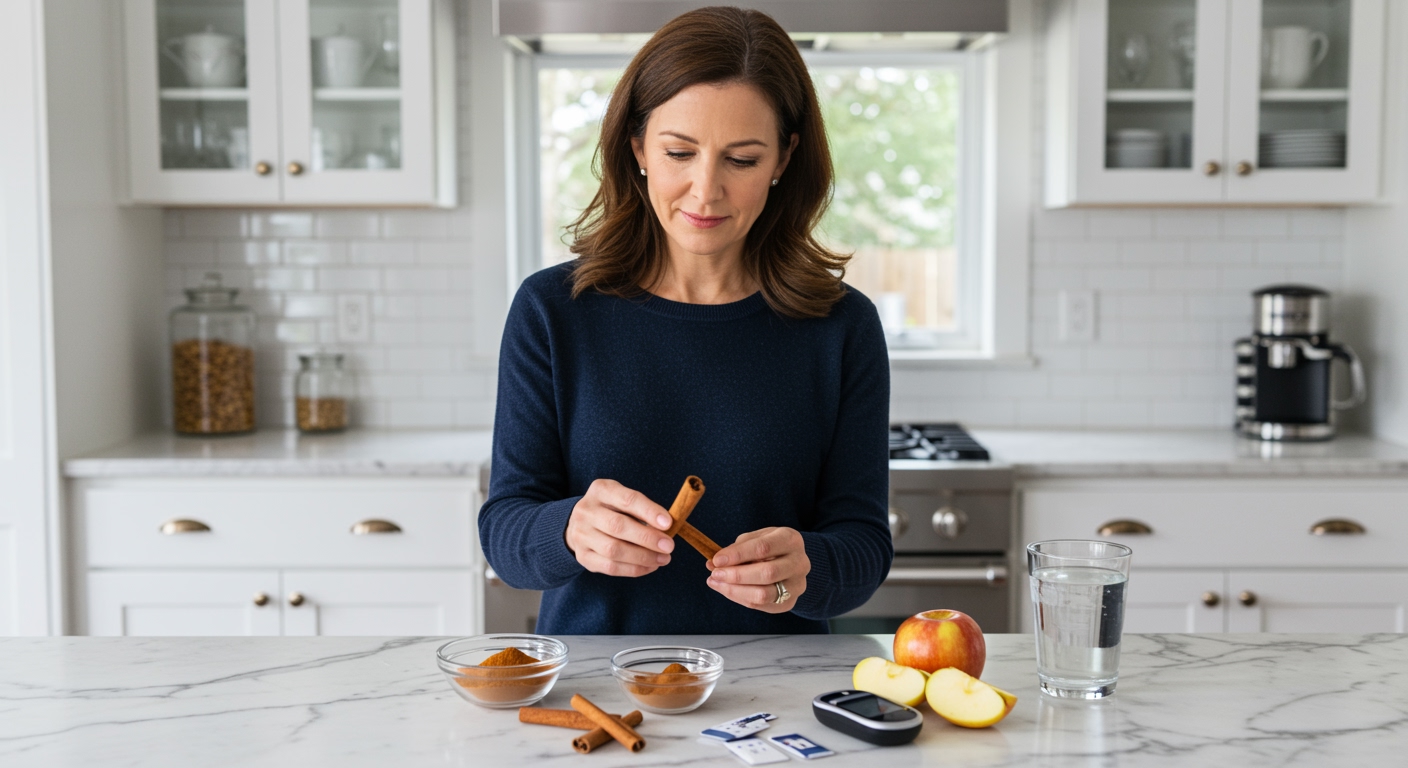✪ Key Takeaway: Ceylon cinnamon may help lower blood sugar levels, but it works best as part of a complete diabetes management plan.
Introduction
Your morning coffee tastes better with a sprinkle of cinnamon, but could this simple spice actually help control your diabetes?
You might be wondering about Ceylon cinnamon because you have heard it works differently than regular cinnamon for blood sugar control.
Hi, I am Abdur, your nutrition coach and today I am going to explain everything you need to know about Ceylon cinnamon and diabetes management.
What Makes Ceylon Cinnamon Different From Regular Cinnamon?
Ceylon cinnamon comes from the bark of the Cinnamomum verum tree, which grows mainly in Sri Lanka.
Regular cinnamon, called Cassia cinnamon, contains high amounts of a compound called coumarin that can damage your liver when consumed regularly.
Ceylon cinnamon has much lower coumarin levels, making it safer for daily use.
The taste difference is noticeable too – Ceylon cinnamon tastes sweeter and milder compared to the stronger, more bitter flavor of Cassia cinnamon.
Most grocery stores sell Cassia cinnamon because it costs less to produce.
You need to specifically look for Ceylon cinnamon on the label or buy it from specialty spice shops.
✪ Fact: Ceylon cinnamon contains 250 times less coumarin than Cassia cinnamon, making it much safer for regular consumption.
How Does Ceylon Cinnamon Affect Blood Sugar Levels?
Ceylon cinnamon contains active compounds called polyphenols that may help your body use insulin more effectively.
These compounds work by mimicking insulin and helping glucose move from your bloodstream into your cells.
Research shows that cinnamon may slow down the digestion of carbohydrates in your small intestine, which prevents rapid spikes in blood sugar after meals.
The spice also appears to increase something called glucose transporter proteins that help move sugar into your muscle cells.
Some studies suggest that regular cinnamon consumption may reduce fasting blood glucose levels by 10-29% in people with type 2 diabetes.
However, the effects vary greatly between individuals, and not everyone experiences the same blood sugar benefits.
✪ Pro Tip: Take cinnamon with meals containing carbohydrates to potentially reduce post-meal blood sugar spikes.
What Does The Research Say About Cinnamon And Diabetes?
Multiple studies have examined cinnamon for diabetes management with mixed results.
A 2023 review of clinical trials found that cinnamon supplementation reduced fasting blood glucose and hemoglobin A1C levels in people with type 2 diabetes.
The most significant improvements occurred in studies where participants took 1-6 grams of cinnamon daily for at least 12 weeks.
However, some studies showed no significant effects, particularly in people with well-controlled diabetes who were already taking medication.
The research suggests that cinnamon works better as a complementary therapy rather than a standalone treatment for diabetes.
Most studies used cinnamon extract or powder rather than whole cinnamon sticks, which may concentrate the active compounds.
The quality and type of cinnamon used in studies varied, making it difficult to draw definitive conclusions about optimal dosage.
✪ Note: Research results vary widely, so cinnamon should never replace prescribed diabetes medications without medical supervision.
How Much Ceylon Cinnamon Should You Take For Diabetes?
Most research suggests that 1-3 grams of cinnamon per day may provide blood sugar benefits.
One teaspoon of ground Ceylon cinnamon weighs about 2.6 grams, so half a teaspoon daily falls within the effective range.
You can sprinkle Ceylon cinnamon on oatmeal, yogurt, or coffee, or mix it into smoothies and baked goods.
Taking cinnamon with meals that contain carbohydrates may maximize its blood sugar benefits.
Start with smaller amounts like quarter teaspoon daily and gradually increase to assess your tolerance.
Some people prefer cinnamon supplements, but whole cinnamon powder provides additional fiber and nutrients.
Consistency matters more than large doses – taking a small amount daily works better than occasional large quantities.
✪ Pro Tip: Add Ceylon cinnamon to your morning routine by mixing it into coffee or sprinkling it on breakfast foods.
Are There Any Risks Or Side Effects To Consider?
Ceylon cinnamon is generally safe for most people when consumed in normal food amounts.
However, large doses may cause mouth sores, digestive upset, or allergic reactions in sensitive individuals.
People taking blood sugar medications should monitor their glucose levels carefully when adding cinnamon, as it may enhance medication effects.
Cinnamon can also interact with blood-thinning medications because it has mild anticoagulant properties.
Pregnant and breastfeeding women should stick to normal food amounts and avoid therapeutic doses of cinnamon.
Unlike Cassia cinnamon, Ceylon cinnamon poses minimal liver toxicity risk due to its low coumarin content.
Always consult your healthcare provider before using cinnamon as a diabetes management tool, especially if you take medications.
✪ Note: Monitor blood sugar levels closely when starting cinnamon supplementation, especially if you take diabetes medications.
The Bottom Line
Ceylon cinnamon shows promise for supporting blood sugar control in people with diabetes, but it works best as part of a comprehensive management approach that includes proper diet, exercise, and medical care.
Natural remedies work best when they complement, not replace, proven medical treatments – this principle applies perfectly to using cinnamon for diabetes management.
I would love to hear about your experience with Ceylon cinnamon or any questions you might have about incorporating it into your diabetes management plan – please share your thoughts in the comments below.
References
At NutritionCrown, we use quality and credible sources to ensure our content is accurate and trustworthy. Below are the sources referenced in creating this article:
- Healthline: Cinnamon and Diabetes: What You Need to Know
- PLOS One: The effect of cinnamon supplementation on glycemic control in patients with type 2 diabetes mellitus
- PMC: Cinnamon: A Multifaceted Medicinal Plant
- Diabetology & Metabolic Syndrome: Effects of cinnamon supplementation on expression of systemic inflammation factors
- WebMD: Ceylon Cinnamon – Uses, Side Effects, and More





